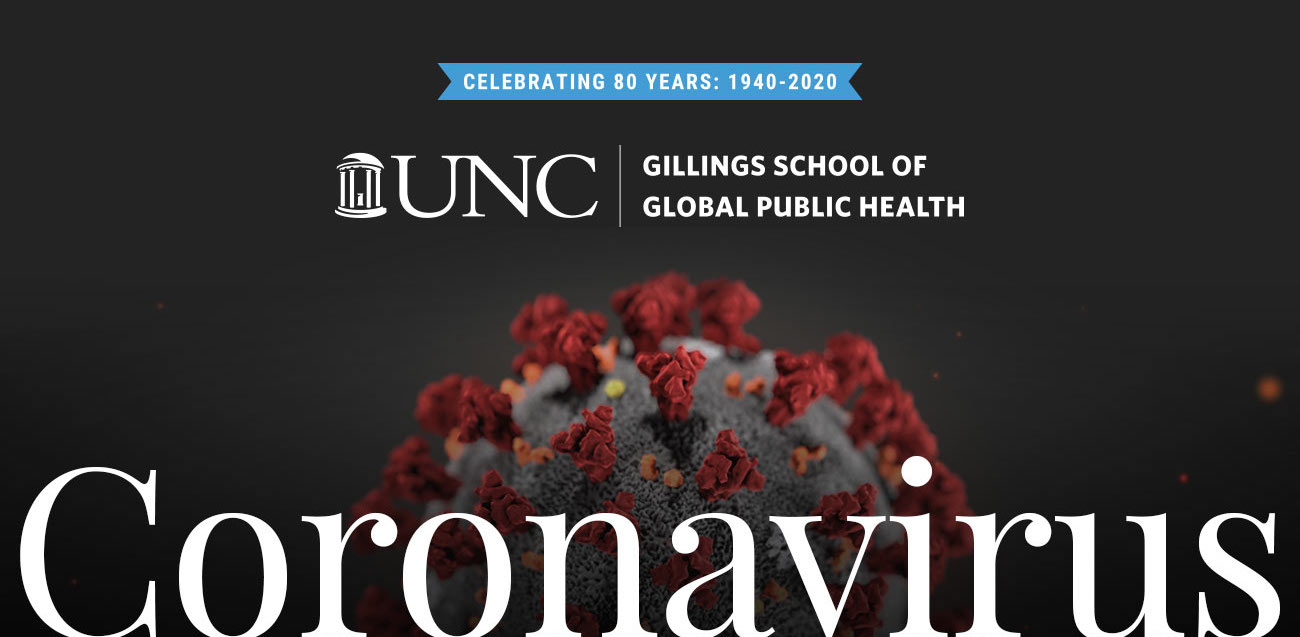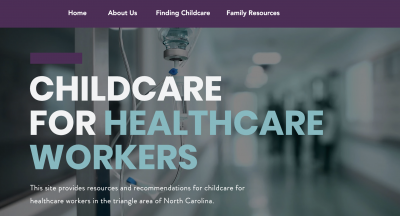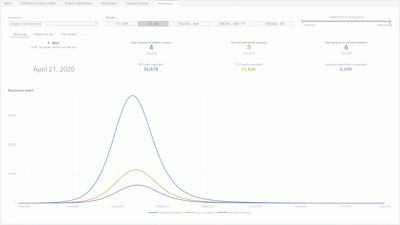The Gillings Community Responds to COVID-19: Leveraging Technology to Address Needs

April 27, 2020
The challenge that COVID-19 poses across the globe epitomizes the importance of public health education and research. At the UNC Gillings School of Global Public Health, students, alumni and faculty from across disciplines are working tirelessly to put learning into action in the face of a global health crisis.
Students, faculty and alumna in health behavior launch emergency child care website for health workers
In the midst of a pandemic, health care workers face a mounting series of challenges that are difficult to anticipate. Thanks to a partnership between UNC Health and the Gillings School, the UNC Task Force for Childcare for Healthcare Workers was created to ensure that finding reliable child care would no longer be one of them.
Co-led by Assistant Professor of Health Behavior Liz Chen, PhD, MPH, and alumna Hannah Prentice-Dunn (MPH ’12), project manager at the UNC Lineberger Comprehensive Cancer Center, this task force – comprised of UNC Health leaders, UNC community members, and public health experts – has come together to generate creative solutions for health care workers impacted by school and day care closures.
Chen and Prentice-Dunn have been working with the task force to survey UNC Health employees, with state officials to identify areas of greatest need and how best to meet them, and with UNC Health leaders to support the development of their child care subsidy program.

Childcarenc.org, developed and designed by a team in health behavior, provides child care resources for health care workers in the Triangle.
One solution came to mind quickly after the task force’s formation: childcarenc.org, a website dedicated to providing child care resources and recommendations for health care workers in the Triangle.
Working quickly – within a remarkable 36-hour time frame – health behavior graduate students Emily Newman and Kathryn Carpenter designed the site based on resources and information provided by the Gillings School and UNC Health, including answers from the task force’s survey.
The challenge of streamlining a vast array of health and child care information into an engaging and accessible resource is nothing new for Newman and Carpenter, who are members of the task force as well as co-founders of the Newman Carpenter creative agency. As students of public health, their education gives them unique insight into the most efficient ways to communicate health information to large populations.
While childcarenc.org’s primary function involves connecting health care workers to information about emergency child care options, it also serves a broader audience of parents and caregivers in the community who are seeking reliable information about how to care for children at home during the COVID-19 pandemic. Those who care for children themselves or must rely on volunteers, friends or family for help may wonder what precautions to take when bringing potential child care providers into their home. They may also wonder what to do if a family member starts showing signs of COVID-19.
In the coming weeks, childcarenc.org will be pointing UNC Health employees to the new subsidy programs that UNC Health and the North Carolina Department of Health and Human Services are offering to parents who need financial support for child care. The website will continue to provide information on where employees can find childcare in their areas and how children can be cared for safely at home amidst COVID-19.
Learn more about childcarenc.org in this feature from the Daily Tar Heel.
Mobile app developed by health behavior faculty and alumna serves teen population during coronavirus crisis

Real Talk crowdsources authentic teen stories on topics like puberty, bullying, and mental health.
Chen is no stranger to designing innovative technological solutions for emerging health needs. She and health behavior alumna Cristina Leos (MSPH, PhD ‘19) are co-founders of the mobile app Real Talk. Launched in 2017 as part of their tech nonprofit MyHealthEd, Inc., Real Talk crowdsources authentic stories from teens on sexual health, mental health and identity-related topics and pairs each story with high-quality resources to help teens get the information and support they need to be healthy.
In a time when schools, workplaces and entire cities have shut down, people have mobilized to provide resources for adults. However, few of these have focused on the emotional and mental health needs of young people, particularly those who may be most vulnerable and in need of support. According to Leos, Real Talk has seen a download increase of 48 percent in the weeks since school closures became widespread.
As part of an effort to understand teen concerns during the pandemic, Real Talk asked users to share their experiences. Many described feeling worried about a COVID-19 health concern, had difficulty coping with school being canceled, or struggling with strained familial relationships. Nearly ten percent of teens surveyed described not having anyone to turn to for support.
Leos says Real Talk is responding to these concerns and support needs through a four-point plan that involves creating the first mental health resource guide available specifically for teens, collecting data and generating new content to monitor needs and how youth are coping with COVID-19, expanding communications and technology platforms to ensure as many teens as possible can access Real Talk content and resources and collaborating with partners to share insights more broadly.
More information can be found on the Real Talk blog.
Read more about Real Talk’s impact during COVID-19 in a recent feature from Forbes.
Biostatistics alumnus collaborates on software to model COVID-19 spread
As part of the Health and Life Sciences Analytics team at SAS, biostatistics alumnus Andrew Williams (BSPH ‘13) has been working with Cleveland Clinic to create a framework that allows for rapid evaluation of many scenarios in multiple modeling techniques for the spread of COVID-19.

A demonstration of a potential user interface for COVID-19 modeling software (courtesy of Andrew Williams at SAS)
The work is based on an epidemiological compartmental model known as SEIR (Susceptible, Exposed, Infectious, Recovered). In this model, members of a population move through the stages – from susceptible to exposed to infected to recovered – over time based on the characteristics of the virus and people, such as how quickly the virus spreads and how much social distancing is being exercised. SEIR is the foundation for many COVID-19 epidemiological models because, unlike some other respiratory illnesses, the SARS-CoV-2 virus has been shown to have an incubation period wherein the disease can be transmitted to others before symptoms develop in an infected person.
The software model developed by Williams’ team translates the number of infections to clinically relevant numbers – such as how many patients will be hospitalized or on ventilators on any given day – to help Cleveland Clinic prepare for the strain that COVID-19 will put on its healthcare resources.
The code is publicly available and can be found on GitHub.
Williams says the code has already been accessed by other government and healthcare organizations nationwide and globally.
See more general information about COVID-19 at the Gillings School’s Coronavirus Information Portal.
Read more about how Gillings students and alumni are responding to the COVID-19 pandemic in our previous feature.
Find a roundup of all our experts’ coronavirus-related media outreach in this Twitter moment.
Contact the UNC Gillings School of Global Public Health communications team at sphcomm@unc.edu.
